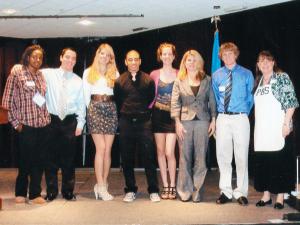Cape students: Program changes school climate
Kirstin Pollock moved to Cape last year. Before her first day of school, she heard so many bad stories about the high school that she was afraid she'd be beaten up the first day; but, when she arrived, she was pleasantly surprised.
"I was shocked at how open and accepting everyone was," said Pollock.
The school had such a bad reputation, students were embarrassed to say they attended, said senior Taylor Harris. Now she says, "I'm proud to be a Viking."
Cape students say the school's climate this year is completely different than it was last year.
"Last year, it was probably in the top 10 worst schools to go to. We were in the paper every week for something bad. Now, we're in the paper every week for something good," said junior Sammy Mohr.
What's behind the turnaround? Students say it's the Positive Behavior Support program.
Before PBS, Cape had a mean vibe, said Mohr. "People came to school every day looking for a fight. It was, 'Who's going to curse out a teacher today? Who's going to be the entertainment?'" Mohr said.
Now, if someone acts up, other students tell that person to grow up, he said.
People started opening up at Challenge Day last fall, students said. It's an all day event designed to foster communication and empathy.
Ian Eckrote, a senior, said, "Not one person left there without crying at least once."
Harris said people who didn't like each other made up during Challenge Day and people who bullied others realized why they had to stop.
During one part of Challenge Day, students who had been victims of bullies walked across a line. "I was looking at their faces and thinking I was probably the reason they crossed that line," Harris said. "I felt sad."
Mohr said PBS also changed the way he acts toward others. "I used to be the first one to make fun of people. Then we had the bullying PBS lesson. I didn't know people felt like that – I thought I was teasing them," he said.
The high school has focused on anti-bullying in a variety of ways throughout the school year, including PBS lessons and events and English class essays about bullying.
Six Cape students traveled to Dover last week for a statewide conference on PBS, to show other schools the improvements that have been made under the program and give suggestions on how to start the program. Features of Cape's PBS program were highlighted as ingredients for success.
When the PBS program started last year, Eckrote said, nobody knew much about it or took it very seriously.
"This year, we look forward to it every month," he said. The program has monthly lessons on topics important to the student body, including bullying, autism awareness and domestic violence awareness.
Thursday, April 21, Beebe Medical Center sponsored a video presentation called "Balance of Power," which explained that life isn't fair, but people can choose how to react to obstacles. Students featured in the video said each person has the power to choose to succeed or fail.
Harris and other students credit high school guidance counselor Terry Sutton, who coordinates the PBS program, with its success.
As part of PBS, students also receive write-ups for good behavior and rewards for doing well. The school's parent boosters club hosts monthly grade-level socials for students, and classes can win Surf Bagel breakfasts though the PBS program.
Last week, American Idol contestant and Cape grad Jimmie Allen performed concerts during lunch as part of the PBS rewards program.
"It's nice to be recognized for doing nice things, not just punished for doing bad things," said Natalie Minard.
Student involvement
At the PBS conference, Mohr recounted some of the high school PBS lessons about bullying, including cyberbullying and text-message bullying.
Delaware's Attorney General visited Cape in October, talking with students about the dangers of cyberbullying and sexting. He praised the school's PBS program and anti-bullying efforts.
Eckrote spoke to the conference about how his class has changed over its high school career. "In ninth-grade, Mariner and Beacon came together at the Ninth-Grade Campus. There was such a big rivalry until the end of the year, when we realized we had to go to the big school, and we'd be the youngest there," Eckrote said.
Eckrote said any student who wants to take part in the PBS program is welcome. "The best part is we don't have to have all the best grades or be the most popular," he said.
Minard said, "If you want to be part of PBS, there's something for you to do."
Minard spoke about autism awareness and the lesson high-school students taught their peers about autism. "We all have differences, but we all have similarities, and we all make up Cape Henlopen High School," she said.
During a lesson about autism, students talked about friends they've made through the Best Buddies program, which pairs students with peers with intellectual disabilities. They also spoke about the Special Olympics campaign Spread the Word to End the Word, which encourages people to stop using the words "retard" and "retarded." More than 500 Cape students signed a banner in support of that program.
Harris spoke during the conference about a domestic-violence project her childcare class did earlier in the year. Class members taught at PBS lesson on domestic violence and set up a display of colored T-shirts, each color representing a woman who suffered from abuse, including women who are abused because of their sexuality.
"We have changed the culture in Cape with PBS," said Mohr. "At Cape, it's not just about teachers yelling at students about bullying. It's students telling students and friends telling friends not to bully."





















































